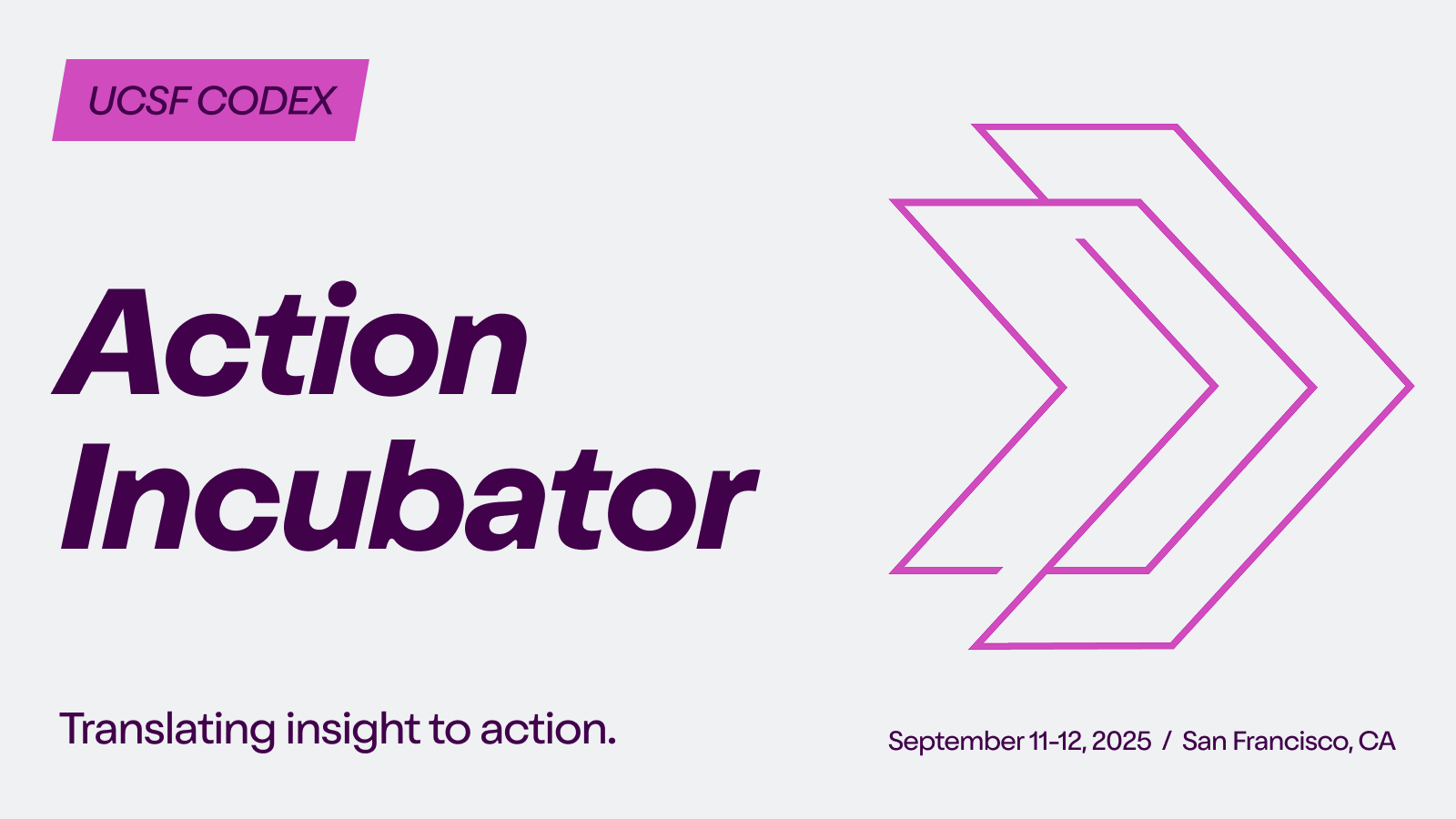Action Incubator

About the Event
UCSF CODEX hosted its inaugural Action Incubator from September 11-12, 2025, at the UCSF Mission Bay campus. The event brought together 30 national leaders from hospitals, insurance companies, private industry, medical malpractice, academic research, and patient advocacy groups to tackle a critical gap in healthcare AI. During this 1.5-day workshop, they explored how AI may affect diagnosis with a goal of co-creating a measurement framework that participants will implement at their institutions to assess the real-world impact of AI tools.
For more information about this effort, click the button to read the full news post or view the video and FAQ below.
Video
Click below to hear from our faculty leads and the event participants.
Frequently Asked Questions

What is an action incubator?
An action incubator is an in-person gathering that brings together a group of people from a broad variety of perspectives who are dedicated to moving concept to action. Unlike typical meetings that produce reports, action incubators are designed to create tangible outcomes that participants can implement at their organizations.
What was the topic of the 2025 UCSF CODEX Action Incubator?
The question posed to the Action Incubator’s participants was: How do we measure diagnostic excellence in the context of ambient scribes and EHR-embedded AI tools?
What is the goal of this meeting?
To develop and refine practical metrics that capture the impact of AI on diagnostic excellence, including accuracy, timeliness, equity, and patient partnership—and to chart a clear path for implementing these measures in real-world healthcare settings in which AI tools are deployed.
Why this topic, and why is it important right now?
There is a systemic implementation gap that has challenged American healthcare for years: the disconnect between scientific innovation and bedside care. As AI tools flood the healthcare market, the need for measures of their impact on diagnostic excellence has become urgent. This proactive approach addresses healthcare's history of technology implementations that don't translate to better patient care.
We need to ensure AI actually improves the diagnostic process in a measurable and meaningful way.
How was the meeting structured?
Over 1.5 days, 30 participants heard about lessons learned from implementing AI in radiology, and explored a broad array of possible measurements for diagnostic excellence in a broader use case of generative AI. Two key themes emerged: 1) AI works best when it augments human expertise, not when it replaces it; and 2) patients' voices and experiences must shape the measures we adopt.
(For details, stay tuned for the forthcoming Action Incubator proceedings document.)
What sets this meeting apart from other healthcare gatherings?
What set this Action Incubator apart was its multi-disciplinary approach. CODEX brought together a diversity of stakeholders from across the ecosystem, including AI developers, healthcare systems, community health centers, academic medical centers, payers, patient safety experts, AI vendors, medical malpractice insurers, researchers, clinicians, federal funders, and patient representatives.
Why is CODEX leading this effort?
CODEX is uniquely positioned with a dedicated center for diagnostic excellence, passionate stakeholders, and strong institutional support from UCSF and affiliate organizations. We're committed to staying ahead of important developments rather than just reacting to them, ensuring new tools benefit patients.
What are the next steps?
The CODEX team will synthesize insights into an actionable measurement framework over the next 12-18 months with ongoing participant feedback. Health system participants—equipped with the integral perspectives offered at the meeting and through ongoing, formalized collaborations—will implement and test the measures at their institutions, providing data on effectiveness and areas for refinement.
What is the intended impact?
To create a coordinated, accountable approach to measuring diagnostic excellence in the context of AI in healthcare. The framework will serve as a model, ensuring AI helps to fulfill its promise to deliver more accurate, timely, and understandable diagnoses for patients while supporting clinicians in their decision-making.
Questions
For questions, please contact [email protected].
